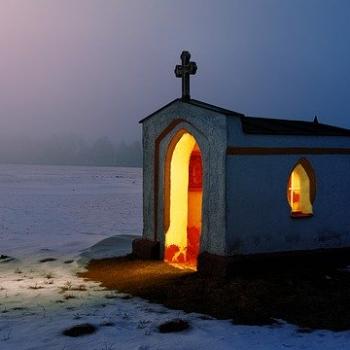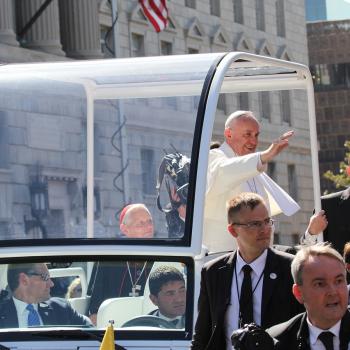From a certain distance, I’ve always been fascinated by the saga of Seattle’s Mars Hill Church. Helmed by charismatic—and controversial—New Calvinist luminary Mark Driscoll, Mars Hill swiftly rose to prominence as a thriving Reformed church network in one of the nation’s least-churched regions And yet Mars Hill’s implosion was almost as dramatic as its rise: Driscoll left the church following a spate of accusations of domineering and abusive behavior, and decamped to Arizona to found the Trinity Church (which has since been dogged with issues of its own). The Mars Hill network subsequently fractured into a constellation of independent churches. Support or reject him, it’s difficult to deny that Driscoll—a superstar of the early-2000s “Young, Restless, and Reformed” movement—was a magnetic, if aggressive and polarizing, presence holding the empire together.
Over the last several weeks, flagship evangelical magazine Christianity Today has been rolling out a podcast series chronicling this tumultuous saga, entitled “The Rise and Fall of Mars Hill.” It’s a slickly produced endeavor, with a level of quality matching anything put out by NPR, Wondery, or Serial, and it’s an undeniably compelling listen.
Even so, partway into the first episode I found myself struck by a nagging feeling of off-ness, an intuitive sense that this wasn’t quite what I had expected. And upon reflection, I realized what seemed so unusual was the podcast’s distinct lack of a substantive “Christian” backdrop. By this, I certainly don’t mean ham-handed attempts to either justify Driscoll’s behavior or simplistically label everything as undifferentiated “sin”; instead, I mean an effort to articulate and defend the claim that what happened at Mars Hill failed to satisfy the standards of conduct that are distinctive to the Christian tradition, as opposed to the standards of modern Western professional society. Put another way, a Christian podcast on this subject should make the case that the fall of Mars Hill was a different sort of thing than, say, the fall of Enron or WeWork, because the pastor is more than a fiduciary or counselor and the church is more than a nonprofit. Maybe this sense of “metanarrative” will emerge before the series concludes, but thus far it hasn’t really shown up.
In CT’s telling, at the heart of the story of Mars Hill Church are the testimonies of those wounded by Driscoll’s pursuit of church growth and power consolidation at any cost. (Driscoll, notoriously, once remarked that “there is a pile of dead bodies behind the Mars Hill bus, and by God’s grace, it’ll be a mountain by the time we’re done.” That is a dangerous pastoral philosophy indeed— and it is a shame that, at least so far, the interpretive framework used to filter the “data” of the experiences of CT’s interview subjects fails to do justice to it.
The story that CT wants to tell, at bottom, is the story of a prominent pastor’s abuse of office. And this naturally requires some preexisting conception of the pastoral role as such, some theological benchmark against which Mars Hill’s practices can be weighed and found wanting. 1 Timothy 3 certainly offers some baseline qualifications for the pastoral office, but these don’t exhaust the qualifications at issue in the Mars Hill saga; at the end of the day, Driscoll was taken to task on the basis of allegedly dysfunctional power relationships vis-à-vis elders, advisers, and congregants. And if the character of those relationships is called into question, fundamental questions of church polity and ecclesiology necessarily rear their heads
To name one example, Presbyterians and Baptists can both identify as “Reformed,” but their conceptions of the pastor’s relationship to authority structures beyond the individual congregation vary dramatically: the Presbyterian tradition urges the need for assemblies of elders beyond the individual congregation, while the Baptist tradition takes a congregationalist view. If one is going to make a fundamentally theological claim like Mark Driscoll got power-hungry and abused his office, one should be able to ground that claim in some idea of what the office of “pastor” entails: was the purported abuse of office a rejection of governance by elders (the Presbyterian view), a rejection of the will of the congregation (the Baptist view), or something else altogether?
The answer to this question, at least so far, is not forthcoming. CT’s podcast seems to take for granted that abuse of office occurred, but declines to construe this abuse in distinctively theological terms. On a certain level this makes sense: as a broadly evangelical publication lacking any particular confessional affiliation, CT has little incentive to take sides in ecclesiological disputes.
But the problem is that, in the absence of a theological argument, what steps in to fill the void is a vague, even secular idea of how pastors and churches ought to behave. So far, CT’s interview subjects and expert commentators have had very little to say about theology, but plenty to say about trauma and about toxic masculinity. And without some higher-order affirmative conception of what the church and pastorate ought to be, it is not clear how far these particular ideological solvents should spread. Are all churches that engage in church discipline, or hold to traditional views on the ordination of women, subject to the same set of critiques CT chooses to direct at Driscoll and Mars Hill? I doubt CTwants to go that far, but it is not clear why the arguments their podcast puts forth don’t inexorably tend in that direction.
Maybe, in the end, this is simply an impasse embedded within any institution that seeks to advocate for evangelicalism as a whole. But even so, it seems to me that prestige podcasts like The Rise and Fall of Mars Hill—untethered from any particular theological core that would allow them to articulate a distinctively confessional argument—carry with them a subtle danger. To my mind, such projects will always risk coming off as expressions of an American Christianity more desperate to establish its credibility in the eyes of “elite” culture—in an age fixated on authenticity, what we might describe as its self-reflective bona fides—than to articulate a vision all its own. The pejorative “Big Eva” is not a phrase of which I’m usually particularly fond, but it seems apt here: where confessional identity is optional, dominant modern conceptions about power and human freedom will always sneak in through the back door.












